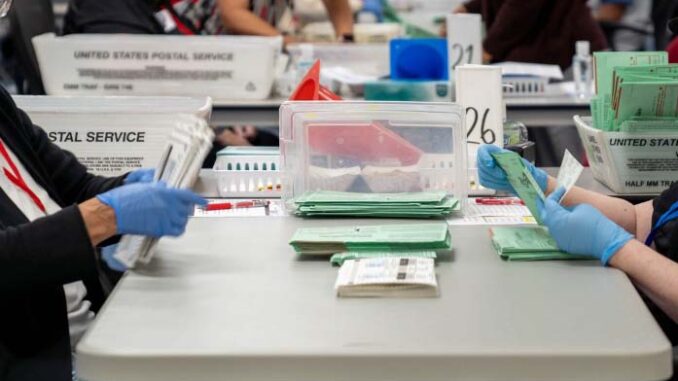
Republican gubernatorial candidate Kari Lake petitioned the Maricopa County Superior Court on Thursday to compel Maricopa County to turn over the 2022 election’s early ballot envelope signatures. The first half of the trial in Lake’s case began Thursday and is scheduled to continue on Monday.
The county denied Lake’s request for the ballot signatures, claiming that it would violate voter privacy law, specifically the “confidentiality requirements” of A.R.S. 16-168(F). Lake turned around and sued Maricopa County Recorder Stephen Richer in April. Lake’s counsel said that the county’s claim of privacy interests in denying the public records request wasn’t valid.
A.R.S. 16-168(F): Any person in possession of a precinct register or list, in whole or part, or any reproduction of a precinct register or list, shall not permit the register or list to be used, bought, sold or otherwise transferred for any purpose except for uses otherwise authorized by this section. A person in possession of information derived from voter registration forms or precinct registers shall not distribute, post or otherwise provide access to any portion of that information through the internet except as authorized by subsection I of this section. Nothing in this section shall preclude public inspection of voter registration records at the office of the county recorder for the purposes prescribed by this section, except that the month and day of birth date, the social security number or any portion thereof, the driver license number or nonoperating identification license number, the Indian census number, the father’s name or mother’s maiden name, the state or country of birth and the records containing a voter’s signature and a voter’s e-mail address shall not be accessible or reproduced by any person other than the voter, by an authorized government official in the scope of the official’s duties, for any purpose by an entity designated by the secretary of state as a voter registration agency pursuant to the national voter registration act of 1993 (P.L. 103-31; 107 Stat. 77), for signature verification on petitions and candidate filings, for election purposes and for news gathering purposes by a person engaged in newspaper, radio, television or reportorial work, or connected with or employed by a newspaper, radio or television station or pursuant to a court order. Notwithstanding any other law, a voter’s e-mail address may not be released for any purpose. A person who violates this subsection or subsection E of this section is guilty of a class 6 felony.
Lake’s attorney, Bryan Blehm, argued that the act of signing ballot affidavit envelopes constituted a public affair that waived all rights of confidentiality.
“Signatures are the way that we — individuals, your honor — identify ourselves to the public,” said Blehm.
Richer testified that the county’s denial of Lake’s public records request wasn’t discriminatory but an unbiased application of the law. Richer said that the statute allowed exceptions that included reviews of ballot signatures by journalists in person.
He also speculated that the publicization of voter signatures would deter individuals from voting early. Richer didn’t agree with the counsel’s statement that publicization of ballot signatures may threaten election integrity.
“If voters know that [ballot] envelope — with their address, with their name, with their signature, with their cell phone number — can be made available to anyone in the world who requests it, do voters behave differently? Do their voting patterns change? Does that mean we have to plan for our elections differently?” asked Richer.
Since Trump’s initial contest to the 2020 election, Richer said that he’s received over 200 calls to his personal email, 100,000 social media messages, and an untold number of emails containing a range of threats.
Much of Richer’s testimony focused on his responsibilities as recorder, as well as the processes for handling early ballots and signature verification. Richer shared that he and the workers responsible for signature verification undergo a four-hour training provided by the Associated Forensics Laboratory.
Richer stopped short of agreeing that signature verification constitutes finding exact matches.
“We’re looking for consistency that we’ve been taught to identify in broad strokes in our training,” said Richer. “I’m reticent to even use the word ‘match,” even just because I say consistency both because that’s what the practice is and that’s what’s set forth in statute and the Election Procedures Manual.”
Richer also shared that his county and most other counties rely on prior ballot envelope signatures to conduct signature verification per now-voided guidance in the 2019 Elections Procedures Manual (EPM) created by then-Secretary of State, now Governor, Katie Hobbs.
In certain curing cases, Richer said that his workers will accept non-matching signatures.
“If it is [flagged as a bad signature] and then we call the voter, and the voter says, ‘Yeah, actually that’s where my signature is at these days,’ then we will [accept that signature] because now we have an updated voter signature where the voter has represented to us is his or her new signature, and that’s helpful to us in future elections,” said Richer.
Richer also said that the county received over 1,300 public record requests last year, compared to the average of 40 “garden variety” requests annually, such as determining the party of an individual. The recorder said that the records requests have enabled harassment and threats to election workers.
Maricopa County’s early voters totaled over 1.3 million out of the nearly 2.6 million ballots cast statewide last November, representing over 29 percent of total registered voters.
The trial resumes on Monday.
The full hearing may be watched here:
